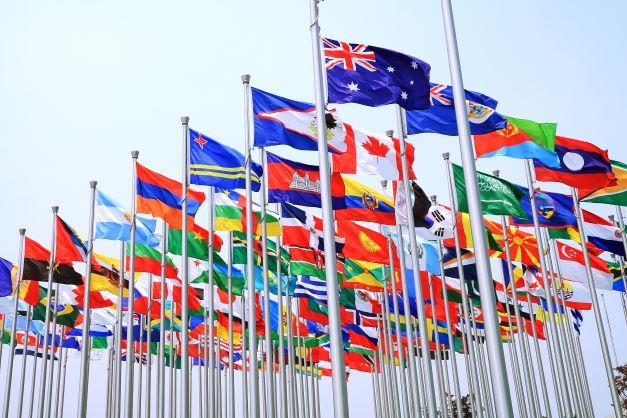Expert Comment: No UN member, whichever continent they are in, can claim Russia's invasion does not concern them
Friday 24th Feb 2023, 1.23pm

Russia’s invasion has been downplayed by states critical of Western policies, as resembling the interventions in Iraq (2003) or Libya (2011), or as just a European war over territory among northern industrial powers. But a far more appropriate comparison is with Saddam Hussein’s 1990 invasion and attempted annexation of the neighbouring state, Kuwait. At the time, even the Soviet Union, in its dying days, approved a United Nations Security Council resolution to reverse by force the Iraqi aggression.
Russia’s invasion has been downplayed by states critical of Western policies, as resembling the interventions in Iraq or Libya, or as just a European war…But a far more appropriate comparison is with Saddam Hussein’s 1990 invasion and attempted annexation of Kuwait
In contrast, since February 2022 Russia and China have vetoed condemnation of Russia’s large-scale attack on Ukraine in the Security Council. In the UN General Assembly, a global majority clearly renounce Russia’s war of choice, but many countries remain non-committal. A resolution on the eve of the anniversary of Russia’s attack calling on Russia immediately and unconditionally to withdraw its troops from Ukraine, was carried by 141 states. Yet 32 countries abstained, including China, India and South Africa.
This fence-sitting is a very troubling. As with the far more limited case of the Iraqi occupation of Kuwait, Russia’s war against Ukraine – unlike more recent Western interventions – is driven by irredentism and is aimed at territorial aggrandizement. This is more than just a gauntlet thrown against a liberal rules-based international order. The invasion threatens the most basic principles of the post-war international system enshrined in the 1945 UN Charter. It is an effort to eradicate Ukrainian sovereignty, leading to what we could call ‘state death’.
This is more than just a gauntlet thrown against a liberal rules-based international order. The invasion threatens the most basic principles of the post-war international system…It is an effort to eradicate Ukrainian sovereignty, leading to…‘state death’
Many post-colonial states have ill-defined borders and disputes with neighbours and fear violation of their sovereignty and territorial integrity, especially by rising powers. Strong states inevitably are taking a close interest in the global reaction to Russian aggression. Some may be pondering the response to any future efforts of their own to overwhelm a weaker neighbour.
Meanwhile, the semi-mystical revanchist rhetoric of the Russian leadership – arguing that ‘historic Russian regions’ can be carved out of Ukraine and talking of restoring a past greater Russia – resembles the specious claims of Fascist regimes in the 1930s.
In rejecting Ukraine’s sovereignty, Vladimir Putin also challenges the statehood of all other former Soviet states. Indeed, he lays claim to the lands of Imperial Russia, beyond Soviet borders. This upends the principles enshrined in the 1975 Helsinki Final Act, the 1990 Paris Charter and post-Cold War cooperation in the OSCE. This is fully understood for example in Poland, which has emerged as a leader in supporting Ukraine, and in Sweden and Finland, which are seeking to enter NATO.
Western states have the full legal right to support Ukraine militarily to restore its sovereignty as an act of collective self-defence against Russian aggression….neither they nor NATO are a party to the war.
Western states have the full legal right to support Ukraine militarily to restore its sovereignty as an act of collective self-defence against Russian aggression. In this sense neither they nor NATO are a party to the war
Yet, considerable efforts are being taken by Ukraine’s Western partners to contain the conflict, both horizontally, from spreading elsewhere into NATO territory, and vertically, risking escalation even to the use of nuclear weapons. There has been a process of verbal signalling, perhaps even the development of some ‘tacit codes or conduct’ or norms of competition around the war. But there will remain inherent risks – in upholding Ukrainian sovereignty, Western leaders cannot allow Putin to exploit what he perceives as the lower acceptable risk threshold of some Western states.
Russia’s calculation is that Ukraine’s Western supporters will tire of a war of attrition and the coalition behind Ukraine eventually will fragment. But Russia’s own capacity for further significant offensive operations in Ukraine is in doubt. Which is why the provision of advanced military equipment to Ukraine in the coming months, to shift the balance, is so important.
Putin painted himself into a corner by formally annexing parts of Ukraine last September. Under the Russian constitution, which Putin revised, Russian cannot negotiate over its ‘territory’. Politically, it seems difficult for him to square this circle if the annexed regions are to be returned to Ukrainian control.
Any end to the conflict which allows Russia to represent its annexations as successful, in any way, would seriously undermine international order at large
Yet any end to the conflict which allows Russia to represent its annexations as successful, in any way, would seriously undermine international order at large, while Kyiv firmly and reasonably believes that, if Russia retains any Ukrainian lands these would be used in the future as a springboard for yet another offensive. The status of Crimea, which Russia has occupied since 2014, is crucial here. It is difficult to conceive of Putin retaining power if Russia loses Crimea. American officials have recently referred to the option of a demilitarization of Crimea as a temporary outcome ‘at the very least’, which implies a possible sequencing for Ukraine to recover fully its territory. Yet most likely, with the current objectives of Moscow and Kyiv so irreconcilable, the war appears set to continue through this year at least.
The coming decades will be more dangerous and unstable if the war further weakens the constraints maintained by core principles of the post-1945 international system. This is far from just a regional, European crisis.

